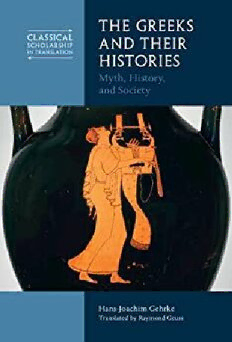
The Greeks and Their Histories: Myth, History, and Society PDF
Preview The Greeks and Their Histories: Myth, History, and Society
THE GREEKS AND THEIR HISTORIES In this concise but stimulating book on history and Greek culture, Hans-Joachim Gehrke continues to refine his work on ‘intentional history’, which he defines as a history in the self-understanding of social groups and communities – connected to a corresponding understandingoftheother–whichisimportant,evenessential,for the collective identity, social cohesion, political behaviour, and cul- tural orientation of such units. In a series of four chapters, Gehrke illustrates how Greeks' histories were consciously employed to help shapepoliticalandsocialrealities.Inparticular,hearguesthatpoets wereinitiallythemastersofthepast,andthatthisdominanceofthe aestheticintheviewofthepastledtoanindissolubleamalgamation ofmythandhistoryandlastingtensionbetweenpoetryandtruthin the genre of historiography. The book reveals a more sophisticated pictureofGreekhistoriography,itsintellectual foundations,andits widersocial-politicalcontexts. HANS-JOACHIM GEHRKE is Professor Emeritus of Ancient History at the University of Freiburg (Breisgau). He was Professor and Visiting Scholar at several German and European universities, and President of the German Archaeological Institute. He is the editorofMakingCivilisations(2020). CLASSICALSCHOLARSHIPINTRANSLATION Serieseditors renaud gagne´, university of cambridge jonas grethlein, ruprecht-karls-universita¨t heidelberg Classical Scholarship in Translation provides English translations of some particularly notable and significant scholarship on the ancient Greek and Roman worlds and their reception written in other languages in order to make itbetterknownandappreciated.Allareasofclassicalscholarshipareconsidered. Recenttitlesintheseries: TheGreeksandTheirHistories:Myth,History,andSociety hans-joachim gehrke TheHeraofZeus:IntimateEnemy,UltimateSpouse vinciane pirenne-delforge and gabriella pironti THE GREEKS AND THEIR HISTORIES Myth, History, and Society HANS-JOACHIM GEHRKE Albert-Ludwigs-UniversitätFreiburg,Germany TranslatedbyRaymondGeuss,UniversityofCambridge ShaftesburyRoad,Cambridgecb28EA,UnitedKingdom OneLibertyPlaza,20thFloor,NewYork,ny10006,USA 477WilliamstownRoad,PortMelbourne,vic3207,Australia 314–321,3rdFloor,Plot3,SplendorForum,JasolaDistrictCentre, NewDelhi–110025,India 103PenangRoad,#05–06/07,VisioncrestCommercial,Singapore238467 CambridgeUniversityPressispartofCambridgeUniversityPress&Assessment, adepartmentoftheUniversityofCambridge. WesharetheUniversity’smissiontocontributetosocietythroughthepursuitof education,learningandresearchatthehighestinternationallevelsofexcellence. www.cambridge.org Informationonthistitle:www.cambridge.org/9781316519783 doi:10.1017/9781009022279 PrefaceandEnglishtranslation©CambridgeUniversityPress2023 Firstpublishedin2014asHans-JoachimGehrke:GeschichtealsElementantikerKultur© WalterdeGruyterGmbHBerlinBoston.Allrightsreserved. Thisworkmaynotbetranslatedorcopiedinwholeorpartwithoutthewrittenpermissionofthe publisher(WalterDeGruyterGmbH,GenthinerStraße13,10785Berlin,Germany). Thispublicationisincopyright.Subjecttostatutoryexceptionandtotheprovisions ofrelevantcollectivelicensingagreements,noreproductionofanypartmaytake placewithoutthewrittenpermissionofCambridgeUniversityPress&Assessment. Firstpublished2023 AcataloguerecordforthispublicationisavailablefromtheBritishLibrary. ACataloging-in-PublicationdatarecordforthisbookisavailablefromtheLibraryofCongress isbn978-1-316-51978-3Hardback CambridgeUniversityPress&Assessmenthasnoresponsibilityforthepersistence oraccuracyofURLsforexternalorthird-partyinternetwebsitesreferredtointhis publicationanddoesnotguaranteethatanycontentonsuchwebsitesis,orwill remain,accurateorappropriate. Contents ForewordbyJonasGrethlein pagevii PrefacetotheGermanEdition xi Preface xv NoteonAbbreviations xvii Introduction 1 1 TheLocusofIntentionalHistory:Reference-Group– Producers–Media 10 2 GreekMythsAsaHistoryoftheGreeks:Motifs– Forms–Structures 42 3 GreekHistoriographybetweenPastandPresent 73 4 GreekHistoriographybetweenFictionandTruth 95 ConcludingPerspectives 133 References 138 Index 161 v Foreword Jonas Grethlein Ranke famously declared that it is the task of the historian to reconstruct thepast‘howitactuallywas’andheidentifiedThucydidesasthe‘fatherof all true history’. Both his understanding of history and his esteem for Thucydides are representative of the nineteenth century, a century in which historiography blossomed into a leading discipline. The ideas of historicism soon came under fire – Nietzsche fiercely polemicised against theanaemiaofantiquarianismwhilehistorianslikeLamprechtchallenged theinordinatefocusonthepoliticalhistoryofthestate–butitspremises weretohavealastingimpactonapproachestoantiquityanditsrelationto the past. For a long time, scholars concentrated on ancient historians, envisaging them as the predecessors of modern historians. If non- historiographic forms of memory came into view, they were considered chiefly as steps in a development that would ultimately lead to the emer- 1 genceofhistoriography. Thepastdecades,however,haveseenamountinginterestinthevarious forms and media of memory. To give a few examples: Loraux (1981) examined funeral speeches as the semi-official history of Athens; Bowie (1986) made a case for historical elegy, which was corroborated by the discovery of the ‘New Simonides’; Chaniotis2 investigated inscriptional records of the past; Alcock (2002) considered the role of ruins and other materialremains;Higbie(2003)exploredthecommemorativefunctionof votivesinherstudyoftheLindianchronicle.Inquiriesintothememoryof particular events – for example, Jung (2006) on the battles of Marathon and Plataea and Luraghi (2008) on the construction of the Messenian past–alsoaddressedawiderangeofmedia. 1 Forexample,Deichgräber,Karl(1952,7–56);Gomme,A.W.(1954)TheGreekAttitudetoPoetryand History,Berkeley;Châtelet,François(1962)Lanaissancedel’histoire,Paris;Mazzarino,Santo(1966)Il pensierostoricoclassico,Rome. 2 Chaniotis,Angelos(1988)HistorieundHistorikerindengriechischenInschriften,Stuttgart. vii viii Foreword Despite this widening of the scope, the privileging of historiography, explicitorimplicit,hasproventenacious.ItistangibleeveninBoedeker’s masterfulandfar-reachingsurveyofrepresentationsofthePersianWarin the fifth century BC when she speaks of ‘the paradox that historiography itselfdevelopslateinacitysorichinmemorialsofitsgreatpastdeeds’.3Isit a paradox? Should we not rather ask why historiography emerged in an alreadycrowdedfieldofmemory? ItisoneofthemeritsofGehrke’sTheGreeksandTheirHistoriesthatit providesaconceptualgridthatallowsustoexaminevariouscommemora- tive media in their own right as well as reassess historiography. Gehrke advanceswhathecalls‘aneticperspectiveonanemic(intentional)stateof affairs’, that is, a reconstruction in our terms of how the Greeks viewed theirpast(andnottheexaminationofthecorrectnessoftheirmemories). WhiletheframeworkisthussetbyBerger’sandLuckmann’ssociologyof knowledge,whichtacklesthestructuresofplausibilitiesforgedinasociety, thebroadfocusisinspiredbyHalbwachs’conceptofmémoirecollectiveand itsreceptionbyAssmann.Morespecifically,Gehrkeresuscitatesthenotion of‘intentionalhistory’,coinedbytheanthropologistMühlmann(1938)in the analysis of ethnic identities and later made fruitful for the study of history by Wenskus (1961). ‘Intentional history’ signifies the memories of thepastthathelpdefinetheidentityofagroup.Theheuristicvalueofthis termisthatitsidelinesthequestionofwhetherancientrecordsofthepast arereliableornotandinsteadaddressestheirsignificanceandfunctionsfor thegroupsthatrememberedthepast. Kant observed that while ‘intuitions without concepts are blind’, ‘thoughts without content are empty’. The richness of the material that GehrkeunfoldsbeforetheeyesofthereaderisanothermeritofTheGreeks andTheirHistories.Bringingtogethersourcesthatbelongtothedomains of different disciplines, he discusses inscriptions as well as oral traditions, examinespictorialrecordsofthepasttogetherwithpoetryandoratory,and issensitivetotheimportanceofrituals.Thenumerousexamplespresented in the course of his study provide compelling evidence for the agonistic structureofGreekmemory,foritsdeeprootsinspecificcontextsandthe close entwinement of the past withthe present. Gehrke’s familiaritywith thefullrangeofsourcesandhisimpressivecommandofscholarshipyield auniquesurveyoftheimportantfunctionsthatthepastservedinancient Greeceandthemultitudeofformsinwhichitwasevoked. 3 Boedeker,Deborah(1988)Democracy,Empire,andtheArtsinFifth-CenturyAthens,Cambridge,MA, 185–6. Foreword ix Gehrke’s book also substantiates a key hope attached to the series Classical Scholarship in Translation. The series aims not only to make the books selected for translation better known in the anglophone world but also to give readers access to the traditions to which the books are indebted. Gehrke’s thinking, for example, is influenced by his mentor Heuß and his interest in how the Greeks envisaged the world. He also draws on other works that have received little attention in anglophone scholarship, for example, Prinz’s (1979) investigation of ancient Greek foundation myths and the articles of Strasburger (1982/1990) on memory and historiography. Of course, new questions have surfaced, and new approacheshavebeenusheredin,but,forexample,Strasburger’sreassess- mentofHellenistichistoriographyandhisargumentthattheexperiential accounts by Agatharchides and others, instead of being a deterioration of methodologicalstandards,needtobetakenseriouslyasaformofmimesis, stillreadfresh. The argument of Gehrke itself illustrates the boundaries between nationaltraditionsofscholarship.Inthesecondhalfofthebook,Gehrke turns to historiography, which he also considers as a form of intentional history, without, however, ignoring what distinguishes the reports of Herodotus&Co.fromotherformsofmemory.Oneofthelinksbetween historiographic and non-historiographic memory on which Gehrke elab- oratesisrhetoric.Giventhesalienceof rhetoricintheancientworld,this emphasis is not surprising, but it is noteworthy that Gehrke does not referencetheworksofWoodman,which,whilebeingdiscussedcontrover- sially, were key for directing the focus of anglophone scholars on the rhetorical nature of ancient historiography. The comparison is illuminat- ing -Woodman pushes his argument far, contending ‘that there is no theoretical basis whatsoever for the view that classical historiography resembles its namesake. Historiography was regarded by the ancients as not essentially different from poetry: each was a branch of rhetoric, and therefore historiography, like poetry, employs the concepts associated with, and relies upon the expectations generated by, a rhetorical genre.’4 Gehrke, on the other hand, does not see rhetoric and truth necessarily at loggerheads–hesees,ofcourse,thedangerofneglectingthetruthinorder todazzlethereader,but,awareofthecloserelationbetweenexperienceand narrative,henotesthatnarrativeisanindispensablemeansofrepresenting the past and its careful crafting has the capacity of making it present to readers. 4 Woodman,A.J.(1988)RhetoricinClassicalHistoriography,London,x.
